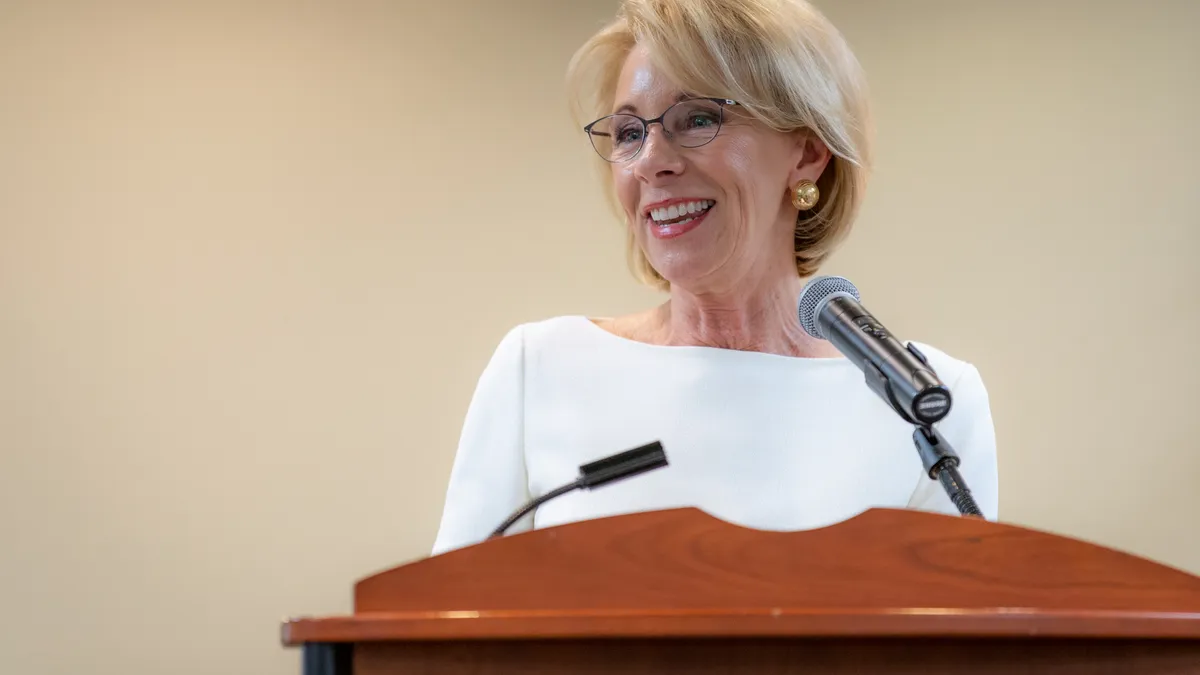Dive Brief:
- A federal judge ruled last Thursday that U.S. Education Secretary Betsy DeVos violated the law in delaying for two years an Obama-era regulation that mandated states to examine and address any racial disparities in special education. The rule was drafted under the Individuals with Disabilities in Education Act (IDEA), which requires states to implement a “more consistent, standardized evaluation process” in evaluating whether there is “significant disproportionality" in the way school districts identify and discipline minority children with special needs.
- The ruling is a favorable one for the Council for Parent Advocates and Attorneys (COPAA), which sued the Education Department, arguing the delay would lessen the number of school districts required to examine their special education practices, Education Week reported. The Education Department initially argued, among other issues, that the rule needed more study because it could create quotas and prevent some children from receiving services because of their race.
- U.S. District Court Judge Tanya Chutkan ruled there were enough measures in place to prevent quotas and that the Education Department "failed to provide a reasoned explanation for delaying the 2016 Regulations" and "failed to consider the costs of delay, rendering the Delay Regulation arbitrary and capricious.” The Department of Education is reviewing the ruling.
Dive Insight:
While rules requiring school districts to pay attention to the way minorities are identified for special education services and disciplined within them have long been a part of IDEA, the Obama-era rule aimed to streamline the evaluation process. A Washington Post article noted that “a 2013 report from the Government Accountability Office found that states identified just 2% of districts nationwide as having problems with disparities. Advocates suspect the problem is far more widespread.”
Other statistics have supported the notion that minority students are often improperly placed in special education. One study, published in July 2018, found that students of color are often put in special education due to socioeconomic inequalities and social injustices. And when these students are placed in special education programs, COPAA notes, they're subjected to "a less rigorous curriculum," "lower academic and career outcomes than their peers" and "significantly higher high school dropout rate[s]."
The Department announced last summer that it was delaying the date by which states needed to comply with the "significant disproportionality" regulations. Initially, this compliance date was July 1, 2018, but the department postponed it to July 1, 2020. However, the recent court decision means these regulations go into effect immediately, COPAA Executive Director Denise Marshall wrote in a statement released Thursday.
In her statement, Marshall said she feels the ruling will improve conditions for many students who have discriminated against in the past. “While identification of children for special education is deeply complex ... Today’s decision assures States will be required to help their districts who have historically discriminated against children and provide those children with early intervening services rather than ordering their suspension and expulsion from school."
So far, advocates and lawmakers, including U.S. Rep. Robert "Bobby" Scott (D-Va.), chairman of the House Education and Labor Committee, have hailed Chutkan’s decision, The Washington Post reported. Scott deemed the ruling a step forward in the quest for equity in education.
“Today’s court ruling is a major victory for students and parents and an important step toward ensuring that all students have access to a high-quality, equitable education in a safe and healthy environment. The Equity in IDEA rule is necessary to address the over-representation, inappropriate placement, and over-discipline of students of color in special education,” Scott said in a statement. “By forcing the Trump administration to implement the rule, the court’s ruling will put us back on a track toward reversing systemic racial discrimination in education.”














